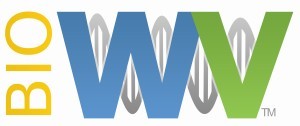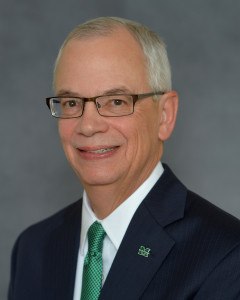WV Bio Summit Highlights Value of Innovation
 The West Virginia Bioscience Association held its Sixth Annual West Virginia Bioscience Summit on April 26 in Huntington on the campus of Marshall University. To read coverage of the event from The State Journal, click here. To read coverage from The Huntington Herald Dispatch, click here.
The West Virginia Bioscience Association held its Sixth Annual West Virginia Bioscience Summit on April 26 in Huntington on the campus of Marshall University. To read coverage of the event from The State Journal, click here. To read coverage from The Huntington Herald Dispatch, click here.
Marshall President Jerome Gilbert opened the event and pointed to the direction of science over the coming century as one consumed with biology and life sciences. “With an exploding population, the life science industries are challenged to find solutions to how we create more food, improve human health and our existence.”
Gilbert believes we’ll see an exponential increase in the speed with which discoveries will be made and implemented. He cited the convergence of biology and technology, and as one example discussed the potential for a ‘brain/computer’ interface. This type of technology could lead to the restoration of ambulatory function for paraplegics, among myriad other uses.
He stated that Marshall University hopes to offer a biomedical engineering program in the future to prepare students for the growing life science device industry. He also firmly believes in the dual importance of preparing students for the STEM fields as well as the liberal arts.
And, he highlighted the growing life science industry in Huntington, to include local biotech companies, Rubberlite’s biomedical line and Alcon.
Michelle Dixon, general manager for Alcon’s Huntington manufacturing facility which employs nearly 800, keynoted the event. “Alcon works to treat vision impairment,” she said. “And, providing sight to those with vision trouble is an incredibly rewarding mission.”
As parent-company Novartis’ second largest division, the company operates globally. At the Huntington
facility, the firm manufactures intraocular lenses. It takes approximately 30 days to make the lens, and the company produces about 10 million per year. With approximately 20 million cataract surgeries occurring annually, there is huge demand for Alcon’s products.
And the company is innovating. Dixon explained that through a partnership with Google, the firm is researching a glucose testing contact lens, as well as contact lenses that work to improve vision as eyesight worsens. These are incredible innovations, and bodes well for Alcon’s West Virginia presence.
Representatives from West Virginia biotech firms – to include the Protea, Cordgenics, Progenesis, CereDx and Micro Biological Consultants – discussed their business model, position in the market and future plans. These firms are successfully moving forward – developing their products and services and leading the charge for innovation development in our state.
Kristin Parde, Deputy Vice President for Policy at the Pharmaceutical Research & Manufacturers of America (PhRMA), outlined the value of innovation to patients. She stated that since 2000, 500 new medicines have come to market and in the past 100 years, life expectancy has gone from 47 to 78 years. And, there are 7,000 new medicines in the development pipeline.
Each of these medicines represent improved lives for tens of thousands of patients, yet tens of billions of dollars in investment before these cures get to the market.
And Jan Taylor, director of the Division of Science and Research for the West Virginia Higher Education Policy Commission, highlighted the amazing research occurring within colleges and universities in the state and the Division of Science & Research’s role in funding assistance. She cited concern, however, for the dwindling resources available for assistance, and encouraged the crowd to continually advocate the need for state support of research and development.
John Maher, Vice President for Research at Marshall University, and Richard Giersch, Director of Health Sciences Innovation, Entrepreneurship & Commercialization at WVU, outlined their organization’s focus and commitment to identifying commercializable research, layering the assistance necessary to bring it to market and companies developing through their programming.
In an effort to highlight research taking place at universities across the state, the event featured the Life Science Research Showcase – a poster session event where faculty-led research teams presented their research. Conducted in a reception format, the event afforded a unique networking opportunity where researchers, funders and others shared ideas and advice.
The event received support from a host of major life science organizations and partners, to include: BIO, Mylan, Marshall University, VWR, Alcon, Sanofi, Novartis, Amgen, PhRMA, and TechConnect West Virginia.


